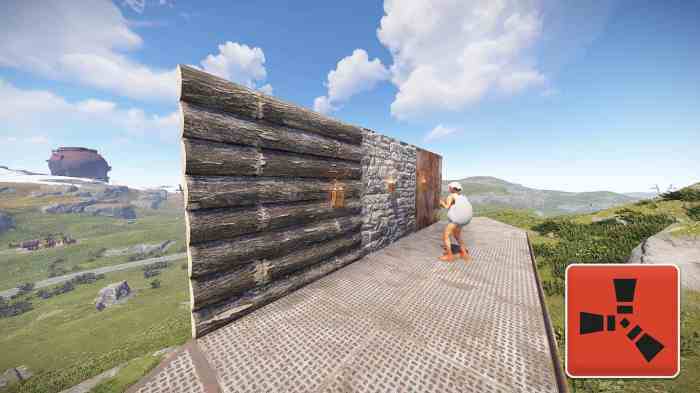Sheet metal walls rust is a prevalent issue that can compromise the integrity and aesthetics of buildings. Understanding the causes, consequences, and preventive measures associated with rust is crucial for ensuring the longevity and performance of sheet metal structures.
In this comprehensive guide, we delve into the intricacies of sheet metal walls rust, providing insights into its origins, impacts, and effective strategies for prevention and repair. We explore the various types of sheet metal walls, the factors that contribute to rust formation, and the detrimental consequences it can have on structural stability and appearance.
Types of Sheet Metal Walls

Sheet metal walls are constructed from various types of metal, each with unique properties and applications.
- Galvanized Steel:Coated with zinc to enhance corrosion resistance, commonly used in exterior applications.
- Aluminum:Lightweight, corrosion-resistant, and often used in architectural and decorative applications.
- Stainless Steel:Highly corrosion-resistant, but more expensive than other options, ideal for demanding environments.
- Copper:Naturally corrosion-resistant, develops a distinctive patina over time, commonly used in high-end architectural projects.
Causes of Rust on Sheet Metal Walls
Rust forms on sheet metal walls due to several factors:
- Moisture:Water and humidity promote electrochemical reactions that lead to rust.
- Oxygen:Oxygen is necessary for the oxidation process that causes rust.
- Electrochemical Reactions:Iron in sheet metal reacts with oxygen and water to form iron oxide (rust).
- Environmental Factors:Coastal areas with high salinity, industrial areas with pollutants, and areas with acidic rain contribute to rust formation.
Consequences of Rust on Sheet Metal Walls

Rust on sheet metal walls can have severe consequences:
- Structural Damage:Rust weakens metal, leading to structural instability and potential collapse.
- Reduced Aesthetics:Rust discolors and damages the appearance of sheet metal walls, affecting the overall aesthetics of the building.
- Health Hazards:Rust particles can flake off and release into the air, posing health risks to occupants.
Prevention of Rust on Sheet Metal Walls
Rust prevention on sheet metal walls involves several techniques:
- Proper Installation:Avoid moisture penetration by ensuring proper flashing and sealing around joints.
- Protective Coatings:Apply rust-resistant coatings such as paint, galvanizing, or anodizing to create a barrier against moisture and oxygen.
- Regular Maintenance:Inspect sheet metal walls regularly, clean debris, and repair any damage to prevent moisture accumulation.
Repair of Rust on Sheet Metal Walls

Rust repair on sheet metal walls involves several steps:
- Surface Preparation:Remove rust using wire brushes, sandblasting, or chemical treatments.
- Rust Removal:Grind or cut out severely rusted areas and replace with new sheet metal.
- Protective Coating Application:Apply a rust-resistant coating to prevent future corrosion.
Design Considerations for Rust Resistance
Design principles for rust-resistant sheet metal walls include:
- Material Selection:Choose corrosion-resistant materials such as stainless steel or aluminum.
- Proper Drainage:Design the walls to prevent water accumulation and promote drainage.
- Ventilation:Ensure adequate ventilation to reduce moisture and condensation.
Case Studies of Rust-Resistant Sheet Metal Walls: Sheet Metal Walls Rust
Examples of successful rust-resistant sheet metal walls include:
- Burj Khalifa, Dubai:Stainless steel cladding provides exceptional corrosion resistance in a highly saline environment.
- Sydney Opera House, Australia:Aluminum cladding withstands the harsh coastal environment.
- Guggenheim Museum Bilbao, Spain:Titanium cladding offers superior corrosion resistance and a distinctive appearance.
Emerging Technologies for Rust Prevention
Advancements in rust prevention for sheet metal walls include:
- Nanotechnology Coatings:Ultra-thin coatings that provide superior corrosion resistance.
- Electrochemical Protection:Using cathodic protection systems to prevent rust formation.
- Self-Healing Coatings:Coatings that automatically repair damaged areas to prevent rust.
FAQ Explained
What are the primary causes of rust on sheet metal walls?
Exposure to moisture, oxygen, and electrochemical reactions are the main culprits behind rust formation on sheet metal walls.
How can I prevent rust on sheet metal walls?
Proper installation, protective coatings, regular maintenance, and strategic design choices can effectively prevent rust on sheet metal walls.
What are the consequences of neglecting rust on sheet metal walls?
Unattended rust can lead to structural damage, reduced aesthetics, and potential health hazards due to the release of iron oxide particles.
